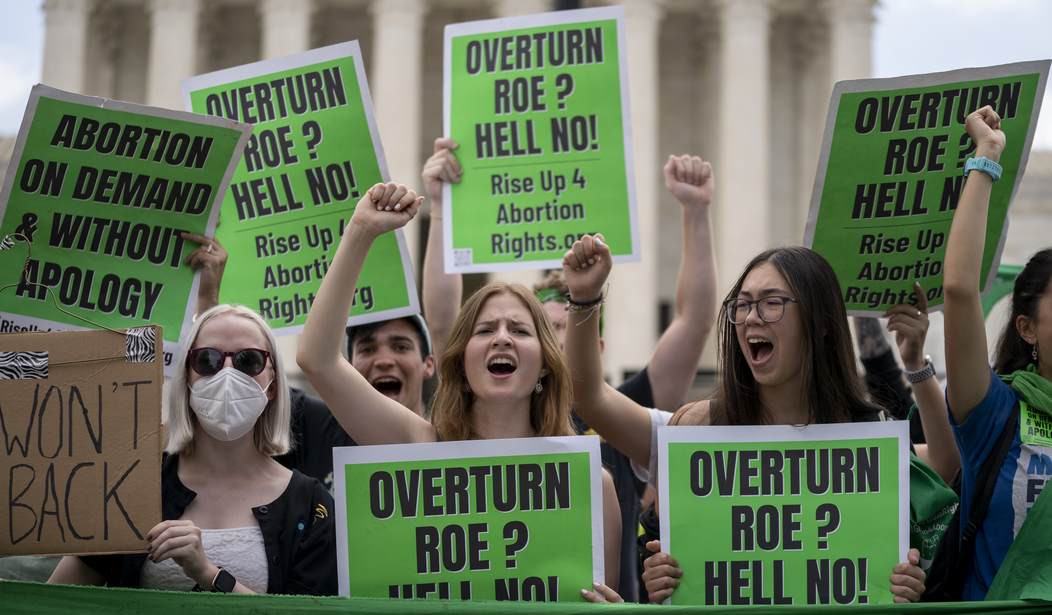Nearly one year ago, the U.S. Supreme Court overturned Roe v. Wade with its Dobbs v. Jackson decision, thus returning the issue of abortion to the people through their elected legislators. For the 49 years that the Roe decision was able to stand, it's estimated that more than 63 million unborn babies were aborted in the United States. Now that Dobbs is the law of the land, states are free to decide their own abortion laws. Some, such as California, have legalized abortion up until birth for any reason. Others have opted to ban or heavily restrict the procedure, especially in the South.
Pro-abortion politicians and organizations have been wringing their hands over the end of Roe even before the Dobbs decision was formally handed down last June, especially after someone leaked a draft of the opinion in May 2022.
It's not enough that states like California have no restrictions on abortion. Democrats want the rest of the country to have to be that way, which is why they've introduced and reintroduced the Women's Health Protection Act (WHPA). If passed, the WHPA would not merely "codify" or "restore" Roe, as Democrats claim. Rather, it would expand it so that abortion would be available for any reason up until birth without legal limits in all 50 states.
Despite how the bill's title acknowledges that it's women who get pregnant and have abortions, the bill's text bends over backward to break with biological reality. "This Act is intended to protect all people with the capacity for pregnancy – cisgender women, transgender men, nonbinary individuals, those who identify with a different gender, and others – who are unjustly harmed by restrictions on abortion services," it reads.
Although the WHPA passed the Democratic-controlled House in the 117th Congress, it couldn't get majority support in the Senate, which was also under Democratic-control, let alone make it past the filibuster. It's almost certainly not going to pass now, even with Democrats gaining a seat in the Senate last year as a result of the midterm elections.
Recommended
House Democrats are thus looking to force the bill to come to the House floor using the discharge petition method. The Tuesday morning edition of the Punchbowl News newsletter referenced such a move:
In the House, Democrats will file a discharge petition to try to force a vote on the Women’s Health Protection Act, which would codify the right to an abortion.
Reps. Diana DeGette (D-Colo.) and Barbara Lee (D-Calif.), who co-chair the Pro-Choice Caucus, and Judy Chu (D-Calif.), who has introduced the bill since 2013, are leading the effort.
Nearly every House Democrat is a co-sponsor of the bill, except for Rep. Henry Cuellar (D-Texas), who has backed abortion restrictions.
Democrats would need 218 signatures to force a vote on the bill, including six to eight Republicans. Of course, they’re unlikely to get this — no Republicans backed the bill when the House voted on it last Congress.
The newsletter also highlighted Sen. Patty Murray (D-WA) is looking to introduce several of their priorities by unanimous consent. Although the move will almost certainly fail, the point is about messaging:
Led by Sen. Patty Murray (D-Wash.), Democratic senators on Wednesday will try to UC bills that codify the right to contraception, allow women to travel across state lines to get an abortion, legally shield doctors who perform abortions for out-of-state patients and safeguard data privacy.
While each is almost certain to fail, the effort amounts to a messaging offensive on what Democrats see as a winning issue. And it will force Republicans to head to the floor and object.
“As we mark the one-year anniversary of the Supreme Court ripping away a woman’s right to an abortion, Senate Democrats will make plain to the American people the devastating consequences and chaos that decision has inflicted on millions of women in this country,” Murray said.
Murray has tweeted and retweeted at great length pro-abortion talking points about the Dobbs decision this week, including remarks at a press conference from Senate Democrats.
“One year ago, Americans lost a constitutional right for the first time in history—and Republicans ripped it away.”
— Senate Democrats (@SenateDems) June 21, 2023
- @PattyMurray lays out how Senate Democrats are fighting back. pic.twitter.com/bcORLumz30
It's worth noting that House Republicans turned to a discharge petition as well for the Born-Alive Abortion Survivors Protection Act, which would mandate that babies born from a failed abortion receive the same amount of care as any other newborn born at that gestational age is entitled to receive under the law.
Then-House Speaker Nancy Pelosi (D-CA) refused to allow the bill to come for a vote in previous sessions of Congress, despite how she considers herself to be "very Catholic."
The bill passed the House in January with a vote of 220-210.
Of course, this isn't limited to members of Congress. President Joe Biden – who also claims to be a devout Catholic – campaigned on what he said would "codify" Roe. His administration has used the annual March for Life – which takes place around the anniversary of the time the Roe decision was handed down in January 1973 – as one more way to promote the WHPA.
In addition to his administration repeatedly calling for passage of the WHPA, its members have held pro-abortion roundtable events with leaders at the state level. The White House just recently held such an event on June 14 and June 15.
Biden and Vice President Kamala Harris, along with First Lady Jill Biden and Second Gentleman Doug Emhoff, will participate in a pro-abortion campaign rally on Friday, with Harris going to North Carolina on Saturday, which is the actual anniversary.
The first lady gave pro-abortion remarks already at an event on Tuesday at the White House.
Republicans, meanwhile, are somewhat divided on how to interpret the Dobbs decision – if they support federal legislation restricting abortion or if the decision should be left up to the individual states. This is the case with Republicans at the state and federal level, as well as presidential candidates.
Sen. Lindsey Graham (R-SC), however, has introduced and reintroduced the Protecting Pain-Capable Unborn Children from Late-Term Abortions Act, as he did last September. The bill would prohibit most abortions nationwide after 15 weeks, when science has shown that unborn children can feel pain.
Winning pro-life candidate Sen. JD Vance (R-OH) spoke in favor of such limits when speaking about basic abortion restrictions at the federal level. He was one of the candidates that Susan B. Anthony Pro-Life America spoke highly of when it praised those who did not shy away from the pro-life position in a call following the midterm elections. Republicans performed much worse than expected, and the pro-life group conducted press calls and put out memos offering that it was pro-life candidates, like Vance, Sen. Marco Rubio (R-FL), and now Sen. Ted Budd (R-NC), who emerged victorious.
SBA Pro-Life America issued a statement in late April rebuking the former and potentially future President Donald Trump's campaign for categorizing Dobbs and abortion as a states issue.
In his capacity as governor, Florida's Ron DeSantis earned praise from the group for signing legislation that restricts abortion at 15 weeks and, more recently, once a heartbeat is detected, at around six weeks gestation.
A study from the Charlotte Lozier Institute in June 2021 illustrates how such gestational limits are the norm in most European countries. Under the WHPA, however, the United States would be more like countries such as China and North Korea.
Stay tuned for more coverage on the Dobbs anniversary from Townhall.

























